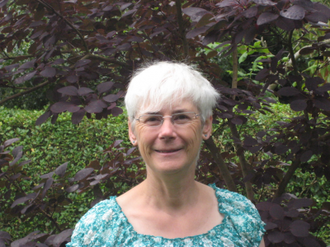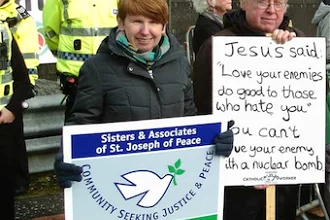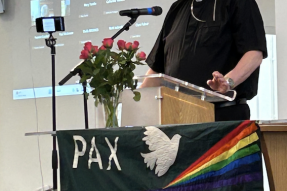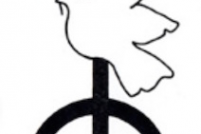'Paths to Peace' - Joan Sharples talk for St Alban's J&P group

Joan Sharples
'Nonviolence - what does it look like today?' This was a question Joan Sharples explored for a zoom meeting on 12 January organised by St Alban's, Macclesfield, Justice and Peace (J&P) group as we approached Peace Sunday. People joined from various parts of Shrewsbury Diocese and beyond, mostly Catholics but also Quakers and a Methodist. Bernadette Bailey, the group's Chair, welcomed us.
Joan started by giving us a bit of background - her own story since she was made redundant as Shrewsbury's J&P Fieldworker in 2012 and that of the Pax Christi's 'Paths to Peace' Nonviolence Initiative. Joan spent a few years undertaking intense grandparenting, and then in 2019 was invited to join the Pax Christi UK executive. She commented that as a Fieldworker she had been involved with many J&P topics but in her new role she was on a steep learning curve just focusing on one issue - Peace.
Joan spoke about the 2016 Conference at the Vatican - 'Nonviolence and Just Peace: Contributing to the Catholic Understanding of and Commitment to Nonviolence', which was organised by the Pontifical Council for Justice & Peace and Pax Christi International. Pope Francis suggested, "your thoughts on revitalising the tools of nonviolence in particular, will be a needed and positive contribution". He encouraged this focus with his address on Peace Sunday 2017. Then in 2019 there was a follow-up conference, 'The Path of Nonviolence: Towards a Culture of Peace' organised by the Dicastery for Promoting Integral Human Development. For those wanting to go more deeply into these events, Joan recommended 'Choosing Peace: The Catholic Church Returns to Gospel Nonviolence' edited by former Pax Christi president Marie Dennis.
From this, seven international groups were formed to explore nonviolence further: Theology & nonviolence, Advocacy, Media & Communication, Bishops, Religious communities, People of God /grassroots engagement and Integrating nonviolence into church structures/ institutions. Joan found herself on the Advocacy group.
So, what does Nonviolence look like in this context? Two people on the group gave their own illustrations. Maryknoll Sister Pat Ryan of Dhuma in Peru works with local people. The river in their valley, known as 'the river that burns', was strongly polluted with waste from a tungsten mine. Sr Pat supported the local peoples' right to be consulted and eventually the river was diverted. Lorretta Castro in the Philippines, as an anti-Marcos protestor, was very uncomfortable with the anger of some protestors. As a teacher she pioneered a programme of peace education. Joan was asked to report on the EAPPI: Ecumenical Accompaniment Programme in Palestine and Israel, which is strong in England and Wales. She also reminded us of the Women in Black who meet each Wednesday for an hour at the Edith Cavell statue opposite the entrance to the National Portrait Gallery in London. This vigil is part of a world-wide network of women committed to peace with justice and actively opposed to injustice, war, militarism and other forms of violence.
In the week following our zoom meeting, The Treaty on the Prohibition of Nuclear Weapons is due to be ratified at the United Nations. The Catholic Bishops' Conference of England and Wales has issued a statement calling on the UK government "to forsake its nuclear arsenal." Joan suggested one nonviolent action we could all take after the meeting was to write to our Bishop congratulating him on this.
Joan finished by looking briefly at the theology of nonviolence. She used as an illustration the two hands of nonviolence which Barbara Deming, a US peace activist, developed. One is held up, saying stop, and the other reaches out in forgiveness and reconciliation. Jesus lived in violent times but he chose the creative way of loving our enemies. Nonviolence is not something passive - doing nothing - but involves action. It means walking the extra mile, sharing our cloak and coat with a stranger. Joan finished with a reflection to help us to develop the practice of nonviolence in our own lives. There followed a short time of discussion.
Joan has offered to repeat her talk on zoom should anyone else or any group like to offer it.
Three websites were suggested to help us:
Catholic Nonviolence Initiative: https://nonviolencejustpeace.net/
Pax Christi International: https://paxchristi.net/
Pax Christi England and Wales: https://paxchristi.org.uk/
We were also reminded that Peace Sunday is usually a time of church collections for the work of Pax Christi, but it is expected that this will not happen in most churches this year so any donations will be gratefully received.


















